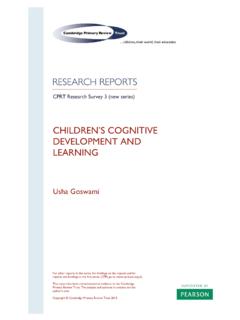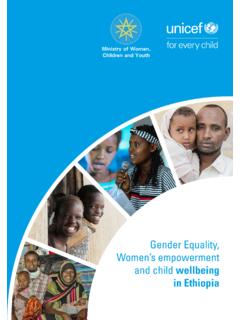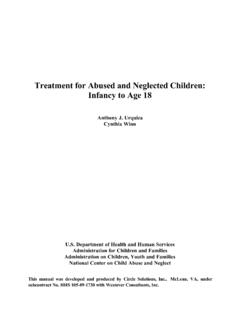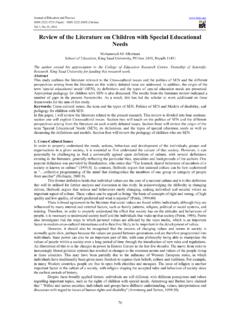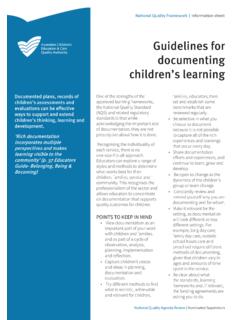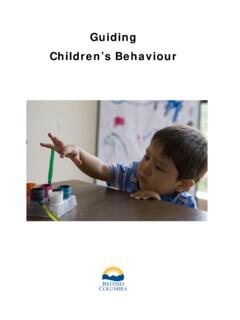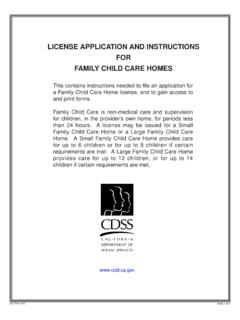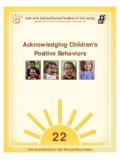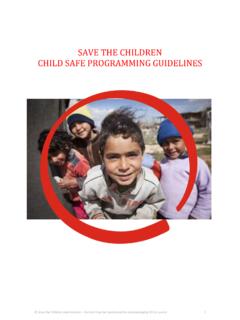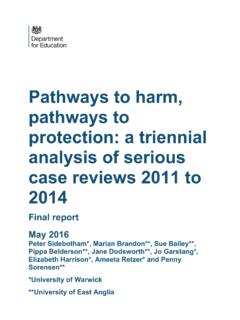Transcription of CHILDREN, THEIR VOICES AND THEIR EXPERIENCES OF …
1 CPRT Research Survey 2 (new series) children , THEIR VOICES AND THEIR EXPERIENCES OF SCHOOL: WHAT DOES THE EVIDENCE TELL US? Carol Robinson For other reports in this series, for briefings on the reports and for reports and briefings in the first series (CPR) go to This report has been commissioned as evidence to the Cambridge Primary Review Trust. The analysis and opinions it contains are the author s own. Copyright Cambridge Primary Review Trust 2014 children , THEIR VOICES AND THEIR EXPERIENCES OF SCHOOL: WHAT DOES THE EVIDENCE TELL US? Carol Robinson A report for the Cambridge Primary Review Trust December 2014 This is one of a series of research reports commissioned by the Cambridge Primary Review Trust, a not-for-profit company established in December 2012 with the aim of consolidating and building on the evidence, findings and principles of the Cambridge Primary Review.
2 Cambridge Primary Review Trust is supported by Pearson Education, based at the University of York and chaired by Professor Robin Alexander. A briefing which summarises key issues from this report is also available. The report and briefing are available electronically at the Trust s website: The website also provides information and other reports in this series, and about the many publications of the Cambridge Primary Review. We want this report to contribute to the debate about the future of primary education, so we would welcome readers comments on anything it contains. Please write to: The report contributes to the Trust s research review programme, which consists of specially-commissioned surveys of published research and other evidence relating to the Trust s eight priorities. This survey relates to priority 2, children s voice : Advance children s voice and rights in school and classroom, in accordance with the UN Convention on the Rights of the Child.
3 Dr Carol Robinson is Principal Research Fellow in the School of Education at the University of Brighton. Her earlier report, children and THEIR primary schools: pupils VOICES (co-authored with Michael Fielding), contributed to the research survey strand of the Cambridge Primary Review and in revised form was published in The Cambridge Primary Review Research Surveys (Routledge, 2010). Suggested citation: Robinson, C. (2014) children , THEIR VOICES and THEIR EXPERIENCES of School: what does the evidence tell us? York: Cambridge Primary Review Trust. Published December 2014 by Cambridge Primary Review Trust, Derwent College M, University of York, York, YO10 5DD, UK. Copyright 2014 Cambridge Primary Review Trust. All rights reserved. The views expressed in this publication are those of the author. They do not necessarily reflect the opinions of Cambridge Primary Review Trust, Pearson Education, or the University of York.
4 British Library Cataloguing in Publication Data: A catalogue record for this publication is available from the British Library. ISBN 978-0-9931032-1-6 1 children , THEIR VOICES AND THEIR EXPERIENCES OF SCHOOL: WHAT DOES THE EVIDENCE TELL US? Abstract This report draws on evidence from empirical studies which explore pupils perspectives on aspects of THEIR primary schooling. It builds on an earlier report children and THEIR primary schools: pupils VOICES (Robinson and Fielding, 2007, updated as Robinson and Fielding, 2010) which reviewed literature from studies based in the United Kingdom (UK) that reported on the EXPERIENCES of primary school children . The overall aim of this report is to consider research literature published since 2007 and, in similar vein to the earlier publications, concentrate on findings from studies based in the UK which have focused on eliciting pupils own perspectives of THEIR primary school EXPERIENCES .
5 In particular, the report focuses on pupils perceptions of the ethos and organisation of primary schools, THEIR perceptions of primary school learning, teaching and assessment, and THEIR views on transfer from primary to secondary school. Specific attention is given to the significance now placed on acknowledging the rights of children , as outlined in the United Nations Convention on the Rights of the Child (UNCRC), and to the recent move by some schools to work towards developing a rights-respecting ethos. Throughout, quotations from children themselves are given prominence by placing them in italics. 1 - INTRODUCTION Since the publication of this report s predecessors in 2007 and 2010, there has been an increasing number of initiatives within the UK aimed at eliciting the views of children and young people about aspects of THEIR lives, including schooling ( The children s Plan: Building Brighter Futures, DCSF, 2007; and Working Together: Listening to the VOICES of children and Young People; DCSF, 2008).
6 A review of UK-based initiatives (Walker and Logan, 2008) demonstrated the wide ranging public and third sector organisations actively working towards developing ways of listening to, and acknowledging , pupils perspectives on school related issues, with many providing resources for use in schools. Several of these organisations continue to develop work in this area, including, amongst others, School Councils UK, a charity which promotes the development of structures for pupil participation in schools, and The Specialist Schools and Academies Trust (SSAT) which provides guidance on learner voice activities. The Cambridge Primary Review itself devoted considerable attention to children and THEIR VOICES . Childhood was one of its overarching themes, and the condition of childhood today, children s development and learning, and THEIR views about THEIR lives inside and outside school featured prominently in the opening chapters of the Review s final report (Alexander et al 2010).
7 Indeed, the Review s first task was to travel round the country talking to a wide range of educational stakeholders about children , THEIR world and THEIR primary education, 2 most prominently children themselves, and this formed the subject of the Review s first report (Alexander and Hargreaves, 2007). The aim of the present report is to build on children and THEIR primary schools: pupils VOICES (Robinson and Fielding, 2007 and 2010, commissioned by the Cambridge Primary Review), and to review research literature published since then which has reported on practices in relation to children , THEIR VOICES and THEIR EXPERIENCES of school. In similar vein to the earlier publications this report concentrates on findings from studies which convey the perspectives of pupils within the UK, and on studies which have explored pupils EXPERIENCES from the perspectives of pupils themselves, and not with studies which have reported teachers perspectives of pupils EXPERIENCES .
8 The report is divided into six main sections, as detailed below, to reflect recent published research reporting on the EXPERIENCES of primary school children . The report s six sections consider primary pupils EXPERIENCES and views on the following: 1. The ethos of primary schools. 2. The organisation of primary schools. 3. Learning within primary schools. 4. Teaching within primary schools. 5. Assessment within primary schools. 6. Transfer from primary to secondary school. These sections differ slightly from those included within the earlier reports, which broadly comprised the six sections listed above, and a further three sections - The purposes of primary schooling ; The primary curriculum ; and Pupils aspirations and preferences in respect of pupils own futures . The scant amount of published research relating to pupils views on the primary curriculum has been incorporated within the sections on learning and teaching within primary schools and, due to the paucity of relevant published research, the remaining two sections from the earlier reports are not included within this review.
9 With the exception of work by Covell (2010; Covell et al 2011), research referred to in this report relates to work where authors have published only one study focusing on the EXPERIENCES of pupils themselves. Covell has published research relating to pupils perspectives on the implementation of a rights-respecting schools approach. However, much of her work relates to teachers or to her own perceptions of pupils perspectives, with only aspects of it reporting on pupils own perspectives. Most of the studies referred to involved between 100 and 450 primary pupils. However, three studies involved considerably fewer, and three involved between 1000 and 2000 participants. Surveys tended to be the favoured data collection methods in studies with larger numbers of participants, while questionnaires and face-to-face interviews were the preferred methods in other studies.
10 None of the studies have purposefully built on findings reported in the original 2007 (Robinson and Fielding) review. However, there is resonance between some of the findings reported in the 2007 review and those reported here. 3 Before discussing each of the sections relating to pupils EXPERIENCES , consideration will be given to the current landscape in which schools are operating. It would be remiss to ignore the significant increase in attention now given to acknowledging the rights of children and young people as outlined in the United Nations Convention on the Rights of the Child (UNCRC) (1989). This development has gained pace since 2007, and reference to children s rights is now evident in many of the policies and practices relating to the lives of children and young people in the UK; this is having a profound impact on children s EXPERIENCES , including THEIR EXPERIENCES of schooling.
